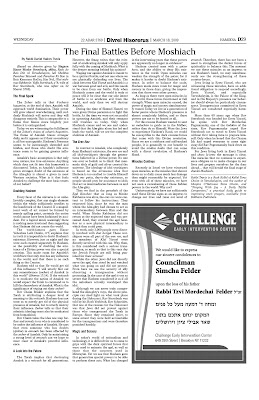JERUSALEM — The publication late last week of eyewitness accounts by Israeli soldiers alleging acute mistreatment of Palestinian civilians in the recent Gaza fighting highlights a debate here about the rules of war. But it also exposes something else: the clash between secular liberals and religious nationalists for control over the army and society.
Several of the testimonies, published by an institute that runs a premilitary course and is affiliated with the left-leaning secular kibbutz movement, showed a distinct impatience with religious soldiers, portraying them as self-appointed holy warriors.
A soldier, identified by the pseudonym Ram, is quoted as saying that in Gaza, “the rabbinate brought in a lot of booklets and articles and their message was very clear: We are the Jewish people, we came to this land by a miracle, God brought us back to this land and now we need to fight to expel the non-Jews who are interfering with our conquest of this holy land. This was the main message, and the whole sense many soldiers had in this operation was of a religious war.”
Dany Zamir, the director of the one-year premilitary course who solicited the testimonies and then leaked them, leading to a promise by the military to investigate, is quoted in the transcripts as expressing anguish over the growing religious nationalist elements of the military.
“If clerics are anointing us with oil and sticking holy books in our hands, and if the soldiers in these units aren’t representative of the whole spectrum of the Jewish people, but rather of certain segments of the population, what can we expect?” he said. “To whom do we complain?”
For the first four decades of Israel’s existence, the army — like many of the country’s institutions — was dominated by kibbutz members who saw themselves as secular, Western and educated. In the past decade or two, religious nationalists, including many from the settler movement in the West Bank, have moved into more and more positions of military responsibility. (In Israeli society, they are a growing force, distinct from, and more modern than, the black-garbed ultra-Orthodox, who are excused from military service.)
In many cases, the religious nationalists have ascended to command positions from precisely the kind of premilitary college course that Mr. Zamir runs — but theirs are run by the religious movements rather than his secular one, meaning that the competition between him and them is both ideological and careerist.
“The officer corps of the elite Golani Brigade is now heavily populated by religious right-wing graduates of the preparatory academies,” noted Moshe Halbertal, a Jewish philosophy professor who co-wrote the military code of ethics and who is himself religiously observant but politically liberal. “The religious right is trying to have an impact on Israeli society through the army.”
For Mr. Halbertal, like for the vast majority of Israelis, the army is an especially sensitive institution because it has always functioned as a social cauldron, throwing together people from all walks of life and scores of ethnic and national backgrounds, and helping form them into a cohesive society with social networks that carry on throughout their lives.
Those who oppose the religious right have been especially concerned about the influence of the military’s chief rabbi, Brig. Gen. Avichai Rontzki, who is himself a West Bank settler and who was very active during the war, spending most of it in the company of the troops in the field.
He took a quotation from a classical Hebrew text and turned it into a slogan during the war: “He who is merciful to the cruel will end up being cruel to the merciful.”
A controversy then arose when a booklet handed out to soldiers was found to contain a rabbinical edict against showing the enemy mercy. The Defense Ministry reprimanded the rabbi.
At the time, in January, Avshalom Vilan, then a leftist member of Parliament, accused the rabbi of having “turned the Israeli military’s activity from fighting out of necessity into a holy war.”[...]






 There are, however, a minority of Charedi Jews that can benefit and therefore should study these issues. It is simply not for everyone.
There are, however, a minority of Charedi Jews that can benefit and therefore should study these issues. It is simply not for everyone.



















